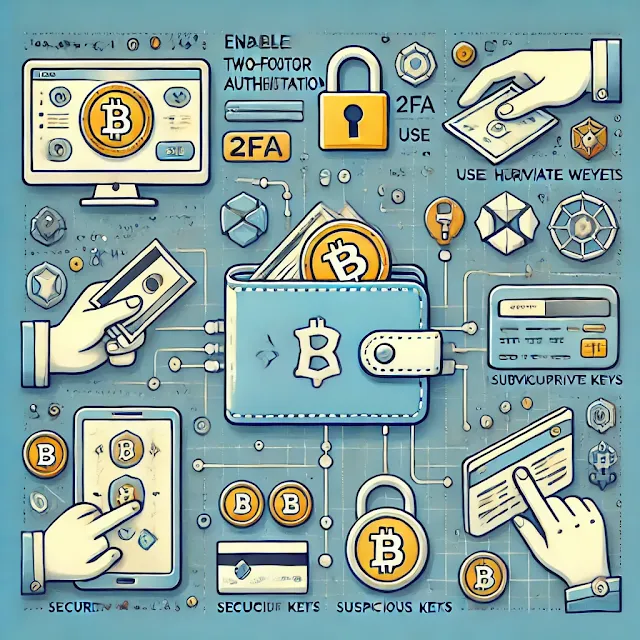Top Crypto Scams and How to Protect Yourself
Cryptocurrency has revolutionized the financial landscape, offering innovative ways to transact and invest. However, with its rise, crypto scams have become increasingly prevalent, posing significant risks to investors. Understanding these scams and knowing how to protect yourself is crucial in today's digital age.
Common Cryptocurrency Scams
The cryptocurrency world is rife with various scams designed to deceive investors. Some of the most common include:
1. Phishing Scams: Scammers impersonate legitimate entities to steal personal information. They often send emails or messages with malicious links, leading to fake websites that capture your credentials.
2. Ponzi Schemes: These involve promising high returns with little risk. Early investors are paid with funds from newer investors, creating a facade of profitability until the scheme collapses.
3. Fake Exchanges: Fraudsters set up counterfeit cryptocurrency exchanges that mimic legitimate platforms, tricking users into depositing funds, which are then stolen.
4. Pump and Dump Schemes: Scammers artificially inflate the price of a cryptocurrency through false or misleading statements, encouraging others to invest before selling off their holdings at the elevated price.
5. Romance Scams: Posing as potential romantic partners, scammers build trust with individuals and then solicit funds or convince them to invest in fraudulent crypto schemes.
How to Protect Yourself from Crypto Scams
Protecting yourself from cryptocurrency scams requires vigilance and informed decision-making. Here are some essential steps:
1. Conduct Thorough Research: Before investing, research the cryptocurrency, the team behind it, and the project's goals. Be cautious of projects that lack transparency or have unverifiable claims.
2. Use Reputable Exchanges: Stick to well-known and established cryptocurrency exchanges. Check for security features like two-factor authentication and cold storage options.
3. Secure Your Wallet: Use hardware wallets for storing significant amounts of cryptocurrency. Ensure your private keys are kept confidential and never share them with anyone.
4. Be Wary of Unrealistic Promises: If an investment opportunity promises guaranteed high returns with no risk, it's likely a scam. Always approach such offers with skepticism.
5. Stay Informed: Keep up-to-date with the latest news in the cryptocurrency space. Join reputable forums and communities to stay informed about potential scams and security threats.
Recognizing Red Flags
Being able to identify warning signs can prevent you from falling victim to scams. Look out for:
1. Unsolicited Messages: Be cautious of unexpected messages, especially those urging immediate investment or sharing personal information.
2. Pressure to Act Quickly: Scammers often create a sense of urgency to prevent you from conducting due diligence. Always take your time to evaluate opportunities.
3. Lack of Verifiable Information: If you cannot find credible information about a project or its team, it's a significant red flag.
4. Requests for Private Keys: No legitimate entity will ask for your private keys. Sharing them can lead to immediate loss of funds.
Steps to Take If You Fall Victim
If you suspect you've been scammed, act promptly:
1. Report the Incident: Contact your local authorities and provide them with all relevant information.
2. Notify Your Bank or Exchange: Inform your financial institutions to monitor for suspicious activity and possibly halt transactions.
3. Change Passwords: Update passwords for all your accounts, especially those related to financial services.
4. Educate Yourself: Learn from the experience to recognize and avoid future scams.
Conclusion
While the cryptocurrency landscape offers exciting opportunities, it's essential to remain vigilant against potential scams. By staying informed, conducting thorough research, and recognizing red flags, you can protect yourself and navigate the crypto world safely.
FAQs
Q1: What is a cryptocurrency scam?
A cryptocurrency scam is a fraudulent attempt to steal money or personal information by exploiting the decentralized and often anonymous nature of digital currencies.
Q2: How can I identify a fake cryptocurrency exchange?
Fake exchanges often have poorly designed websites, lack clear contact information, and may pressure users into making quick deposits. Always verify the legitimacy of an exchange by checking reviews and ensuring it has proper security measures in place.
Q3: Are all high-return cryptocurrency investments scams?
While not all high-return investments are scams, any promise of guaranteed high returns with little to no risk should be approached with skepticism. Always conduct thorough research before investing.
Q4: What should I do if I receive an unsolicited crypto investment offer?
It's best to ignore unsolicited investment offers, especially those that pressure you to act quickly. Do not provide personal information or send funds without conducting proper due diligence.









No comments:
Post a Comment
I genuinely appreciate you taking the time to read this blog post. Your support, comments, and engagement mean so much to me. Whether you’re here for the first time or have been following along for a while, I’m grateful to have you as part of this journey.
If you found value in this post, please consider sharing it or leaving a comment—your feedback helps me create content that resonates with you. Thank you for being a part of this community!
Warm regards,
Daily Boost Guide